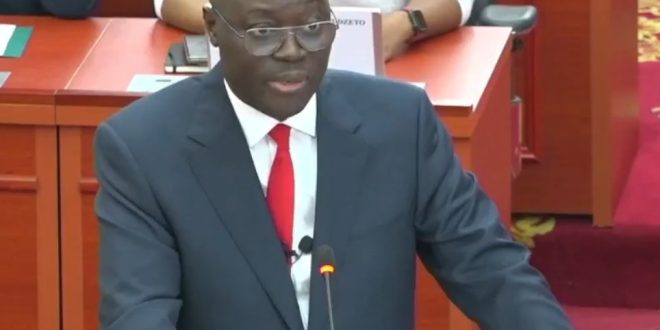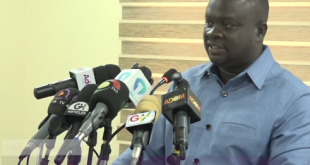The 2026 Budget Statement and Economic Policy presented by Finance Minister Dr. Cassiel Ato Forson on Thursday, November 13, 2025, outlines an ambitious plan aimed at economic transformation, job creation, social development, and fiscal stability.
Here are the key highlights:
1. Job Creation: 800,000 New Opportunities
The government’s infrastructure and industrial initiatives are expected to generate up to 800,000 new jobs across the country.
- Road Infrastructure: GH¢63 billion in road contracts under the Big Push initiative will create approximately 490,000 jobs.
- Industrialisation: Three new garment factories will employ over 20,000 people, while seven agro-processing plants are expected to provide 700 direct jobs and thousands more indirectly.
- Oil Palm Development: The National Policy on Integrated Oil Palm Development (2026–2032) will generate 250,000 jobs across the value chain.
- Farmer Service Centres: Thousands of positions in machinery operation, maintenance, logistics, and support services will be created through nationwide Farmer Service Centres.
To support private-sector-led growth, the government has recapitalised the National Investment Bank (NIB) and will inject GH¢1 billion into the Agricultural Development Bank (ADB) and Consolidated Bank Ghana (CBG). Additionally, GH¢401 million has been allocated to the Women’s Development Bank to empower women entrepreneurs and market traders.
2. Education: Expanding Access and Quality
The government has committed GH¢4.2 billion to the Free Secondary Education (FSE) programme in 2026.
- Ministry of Education: GH¢33.3 billion for programmes and activities.
- GETFund: GH¢9.9 billion to improve infrastructure and learning resources.
- GSLIP: GH¢1.1 billion under the Ghana Secondary Learning Improvement Programme to end the double-track system and improve secondary education quality.
- No Fee Stress Policy: GH¢537 million to remove financial barriers for students.
- Inclusive Education: GH¢25 million for Free Tertiary Education for Persons with Disabilities.
- Menstrual Health: GH¢292 million allocated to provide free sanitary pads for schoolgirls, ensuring no girl misses school due to lack of menstrual hygiene products.
These allocations reflect the government’s commitment to strengthening education at all levels, reducing dropout rates, and promoting gender equality.
3. Health: Strengthening Systems and Access
The government will establish the Ghana Medical Trust Fund to provide sustainable financing for non-communicable diseases and specialised medical services.
- The fund will support treatment for cancer, diabetes, hypertension, stroke, and kidney disease.
- Diagnostics and treatment centres will be built in major hospitals through public-private partnerships, ensuring affordable and uninterrupted care.
- The initiative is part of the Mahama Cares Programme, aimed at improving health infrastructure and moving towards universal health coverage.
4. Agriculture and Food Security: Modernisation and Support
The Farmer Service Centres initiative will provide over 4,000 units of agricultural machinery to 50 selected districts, including tractors, mini-trailers, seed drills, fertiliser spreaders, and combine harvesters.
- These tools aim to increase productivity, reduce manual labour, and improve efficiency across the agricultural value chain.
- The government has also released GH¢200 million to the National Food Buffer Stock Company to purchase and store excess food from this year’s surplus harvest, protecting farmers’ incomes.
5. Energy: Financial Stability and Efficiency
The Electricity Company of Ghana (ECG) has seen its monthly revenue rise from GH¢900 million to GH¢1.7 billion, a 90% increase, following better enforcement of the Cash Waterfall Mechanism and energy sector reforms.
- Power Purchase Agreements: Government renegotiations with independent power producers have saved over US$250 million and restructured GH¢1.1 billion over four years.
- These measures are stabilising the energy sector, reducing costs, and improving reliable power supply for households and industries.
6. Finance and Fiscal Management: Revenue and Debt Control
Dr. Forson highlighted key fiscal achievements:
- E-Levy Removal: Scrapping the Electronic Transfer Levy has not weakened revenue, thanks to improved tax compliance, efficiency in collection, and a broader tax base.
- Public Debt Decline: Total public debt fell from GHS726.7 billion (61.8% of GDP) in 2024 to GHS630.2 billion (45% of GDP) by October 2025. This represents a negative debt accumulation rate of -13.3%—the first in over a decade.
- Import Declaration Forms (IDFs) Abuse: A review uncovered large-scale misuse, with over US$31 billion transferred abroad with no imports, depriving the country of revenue. The government will establish a special recovery unit and an Inter-Agency Committee to prevent future abuse.
A Budget for Growth and Transformation
The 2026 Budget reflects the government’s focus on:
- Job creation and economic empowerment
- Accessible education and gender equality
- Health system strengthening
- Agricultural modernisation and food security
- Energy sector efficiency
- Fiscal discipline and debt reduction
Dr. Forson emphasised that the initiatives are integrated, strategic, and people-centred, aimed at building a Ghana that produces more than it consumes, creates wealth, and shares opportunities with all citizens.
 Adoa News Adoa News
Adoa News Adoa News




